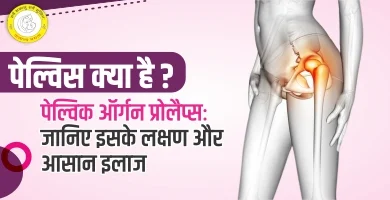The Ultimate Guide To Blocked Fallopian Tubes To Beat Infertility

Do you know fallopian tube disorders account for almost 30% of women who have infertility worldwide? Blocked Fallopian tubes are one of the most common factors of female infertility.
If you’re dealing with blocked fallopian tubes, you may find it hard to have a baby. And it can be emotionally painful. It may cause you a lot of anxiety and depression, and you may keep looking for an authentic solution. All these can feel tough and overwhelming for you. But don’t lose hope! There are solutions to help you overcome this challenge.
Our expert has combined her experience and research to give you the best information. We’ll share all the important facts so you can make informed decisions about your fertility journey. So let’s dive in.
Know the 8 Common Causes for Blocked Fallopian Tubes
In this Article
So, you’re curious about what can cause blocked fallopian tubes, right? Well, here are some reasons in a simple way for you to understand:
Hydrosalpinx
Hydrosalpinx is a type of condition where your fallopian tubes get filled with fluid. The fluid can block the tubes, making it difficult for eggs to travel from the ovaries to the womb.
Infections
Sometimes, germs or bacteria can sneak into your fallopian tubes and cause an infection. This can make your tubes swollen and blocked.
Scar tissue
Sometimes, things like surgery, infections, or even just inflammation can leave behind scar tissue in your fallopian tubes. This scar tissue can make it hard for eggs to travel through your tubes.
Endometriosis
This is a big word that means that the tissue that normally lines your uterus can grow in other places, like your fallopian tubes. This can block your tubes and make it difficult for the eggs to pass through.
Pelvic Inflammatory Disease (PID)
This is another big word that means that you have an infection in your reproductive organs, like your uterus, ovaries, or fallopian tubes. This infection can cause scarring and blockage in your tubes.
Congenital blockage
Sometimes, you can be born with blocked fallopian tubes. This means that your tubes were blocked from the very beginning, even before you were born!
Ectopic pregnancy
This is when a fertilized egg implants outside of your uterus, usually in your fallopian tube. This can cause damage to the tube and block it.
Surgery
If you’ve had surgery on your fallopian tubes before, it can sometimes cause scarring or damage that leads to blockage.
Tubal ligation
If you’ve had a procedure called tubal ligation, a type of permanent birth control, it can sometimes cause fallopian tube blockage
Do You Know the symptoms of blocked fallopian tube?
Well, here are some blocked fallopian tubes symptoms that you should know.
- One symptoms of blocked fallopian tube is a pain in the lower abdomen, like a stomach ache.
- Another symptom is heavy or irregular periods, meaning the bleeding can be heavy or happen at weird times.
- Sometimes, blocked fallopian tubes can cause infections, and one symptom of an infection is having a fever, which means your body temperature goes up, and you might feel hot and sweaty.
- If the blocked fallopian tubes cause an infection, it might also make you feel sick, like you have the flu, with symptoms of blocked fallopian tube like feeling tired, achy, or chills.
Just keep in mind that not all women with blocked fallopian tubes will have symptoms, and some women might not even know they have blocked tubes until they try to get pregnant and have trouble.
Know the 3 Kinds of Diagnosis For Blocked Fallopian Tubes
Hysterosalpingogram
One common test is called a hysterosalpingogram. Difficulty in reading this big word? Just know the meaning. It means they’ll put some special dye into your womb and take pictures with the help of an X-ray to see if the dye can go through your tubes or if they’re blocked.
Laparoscopy
Another test is called a laparoscopy when a doctor uses a special tiny camera to look inside your tummy and check your fallopian tubes. It’s like a little telescope that goes through a tiny cut in your tummy to help the doctor see what’s happening.
Ultrasound
Sometimes, doctors might also use ultrasound, a machine that uses sound waves to take pictures of the inside of your body to better look at your fallopian tubes and see if they’re blocked.
It’s important to remember that if you ever have to go through these tests, the doctors and nurses will do their best to ensure you’re comfortable and understand what’s happening. You can always ask questions if you’re curious or worried about anything.
Know the 4 blocked fallopian tubes treatment Options for how to fix blocked fallopian tubes
Laparoscopic surgery
This is a type of surgery where a doctor uses a tiny camera to go inside your tummy and fix the blockage in your fallopian tubes. It’s like a little telescope that helps the doctor see what’s going on and fix the tubes so they can work better.
The success rate for laparoscopic surgery can vary from 40%-70% for achieving a pregnancy after the procedure.
Tubal Cannulation
This is a procedure where a doctor uses a thin tube to try and unblock the fallopian tubes. The tube is gently inserted through a small cut in your tummy or through the womb, and it can help to clear the blockage and make the tubes open again.
The overall success rate for tubal cannulation can be around 50%.
Tubal ligation reversal
Suppose you had a surgery called tubal ligation, which is a permanent way of preventing pregnancy by blocking the fallopian tubes, and you want to have the blockage reversed. In that case, a doctor can sometimes do another surgery to undo the tubal ligation and make the tubes open again.
The success rate for tubal cannulation can vary from 50%-80%.
IVF (In Vitro Fertilization)
IVF is a fertility treatment where eggs are taken from a woman’s ovaries and mixed with sperm in a lab to create embryos. The embryos are then placed back into the womb, bypassing the blocked fallopian tubes, and achieve a pregnancy.
On average, success rates for IVF can range from 20.6% per cycle.
Bottom Line
You have learned about the causes, symptoms, and blocked fallopian tubes treatment available for Are you ready to beat infertility now? Don’t keep looking further. We have got you covered. Take the first step towards your dream of motherhood and visit our fertility center today. Get a free consultation with our IVF specialist Doctor now.
FAQs
Can a blocked fallopian tube stop your period?
If one of your fallopian tubes is blocked, it can prevent the egg from reaching the uterus and meeting with sperm, which means you might not get pregnant.
But the blocked tube doesn’t stop your period from happening. Your body will still shed the lining of your uterus, and you will still have your period.
Is IVF successful with a blocked tube?
If one of the fallopian tubes is blocked, the eggs might not be able to travel through the tube to meet with sperm, making it difficult to get pregnant naturally.
But with IVF, the eggs and sperm are joined outside the body, so the blocked fallopian tubes don’t stop the process.
IVF can be a successful way to have a baby, even if one or both fallopian tubes are blocked.
Does PCOS cause a blocked fallopian tube?
No, PCOS (Polycystic Ovary Syndrome) does not cause a blocked fallopian tube. Here’s an explanation in simple language with bullet points:
PCOS is a condition that affects a woman’s hormones and ovaries, causing problems with how eggs are released from the ovaries.
Blocked fallopian tubes, however, are caused by physical blockages or damage to the tubes that prevent the eggs from traveling to the uterus.
how to fix blocked fallopian tubes
The treatment for blocked fallopian tubes depends on the cause and severity of the blockage. Medical intervention, such as surgery or assisted reproductive technologies (ART) like IVF, are common options.
how to open fallopian tubes blocked
Blocked fallopian tubes can sometimes be opened through surgery, but this depends on the cause and severity of the blockage.
causes of blocked fallopian tubes
Common causes include pelvic inflammatory disease (PID), endometriosis, ectopic pregnancy, and previous surgery.
how do you know if your fallopian tubes are blocked
Symptoms often include infertility, pelvic pain, abnormal menstrual bleeding, and in some cases, ectopic pregnancy. However, many women with blocked tubes have no symptoms
how to know if your fallopian tube is blocked
Similar to the previous question, symptoms and diagnostic tests are the primary ways to determine if a fallopian tube is blocked.
what causes fallopian tube to be blocked
Common causes include pelvic infections, endometriosis, ectopic pregnancy, and previous surgeries.
where does the egg go if fallopian tubes are blocked
The fallopian tubes are the pathway for the egg to travel from the ovary to the uterus. If blocked, the egg cannot reach the uterus and fertilization cannot occur. In some cases, the egg may become implanted in the fallopian tube, leading to an ectopic pregnancy, which is a serious medical condition.
how do fallopian tubes get blocked
Blockages can occur due to infections, inflammation, scar tissue, or physical damage.



